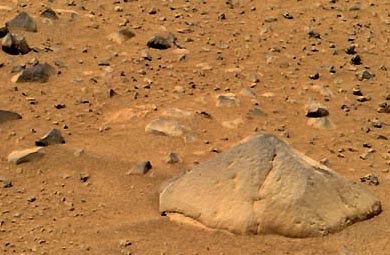February 20, 2004 Pasadena, California - Only one month ago, the Mars Rover called Spirit started working inside the Gusev crater and extended its robotic arm for the first time toward that large pyramid-shaped rock, "Adirondack," to find out what it was made of.

The answer is dark volcanic basalt beneath a dusty coating of red iron dust. In fact, many rocks in the Gusev crater seem to be basalt and scientists are trying to figure out if they came from a volcanic eruption IN the crater? Or were carried by a river of water into the crater long ago? Or maybe were even blown into the crater by strong Martian winds?
Click here to subscribe and get instant access to read this report.
Click here to check your existing subscription status.
Existing members, login below:
© 1998 - 2025 by Linda Moulton Howe.
All Rights Reserved.

